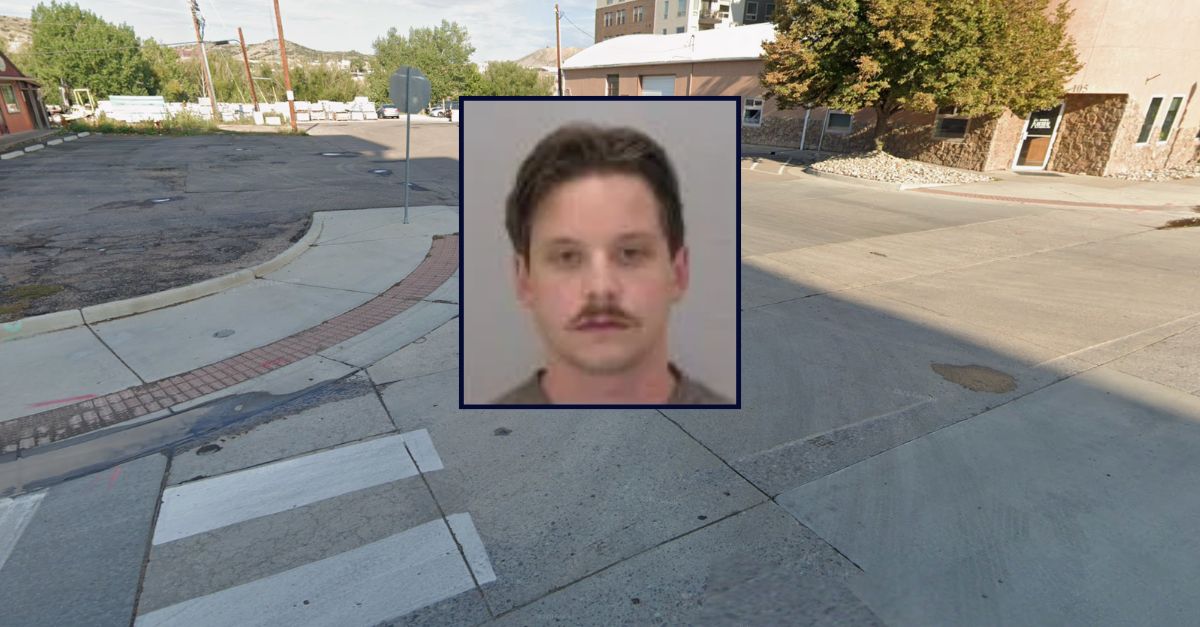
Inset: Samuel Michael (23rd Judicial District Attorney's Office). Background: The crosswalk where Michael struck and killed a man in Castle Rock, Colo. (Google Maps).
A Colorado man received the legal equivalent of mercy after hitting a married couple with his car and killing the husband.
In September, Samuel Robert Michael, 28, pleaded guilty to one count of each vehicular assault resulting in death, vehicular homicide, DUI, careless driving resulting in injury, and careless driving causing significant bodily injury to a vulnerable road user, the District Attorney's Office for the 23rd Judicial District told Law&Crime.
On Monday, 23rd Judicial District Court Judge Elizabeth B. Volz sentenced the defendant to four years of community corrections, which is the Mile High State's version of a halfway house.
The Colorado Department of Corrections website describes the relatively lenient punishment as "a sentencing or placement alternative, in lieu of prison incarceration, for felony offenders."
Love true crime? Sign up for our newsletter, The Law&Crime Docket, to get the latest real-life crime stories delivered right to your inbox.
The underlying incident occurred on Feb. 22. That night, Michael was drinking heavily and got behind the wheel, heading north on First Street in Castle Rock. Then, he turned left onto Wilcox Street.
But Kraig Kazda, 69, and his family were also out that evening.
After eating a dinner downtown with his daughter and son-in-law, Kazda and his wife crossed Wilcox holding hands at a crosswalk, according to a courtroom report by the Douglas County News-Press.
During the sentencing hearing, Michelle Kazda said she remembered the headlights coming for her and her husband. She said there was no chance to escape the vehicle as it headed right for them.
Kraig Kazda was rushed to the intensive care unit at a nearby hospital. He passed away on April 16, suffering from a traumatic brain injury, at a rehabilitation facility after weeks of efforts to save his life.
"They had to restrain him because he would keep pulling the oxygen tubes out of his nose," Michelle Kazda said in comments reported by Denver-based Fox and The CW affiliate KDVR. "He was shutting down."
As it turned out, the defendant's blood alcohol level was almost twice the legal limit of 0.08% when he was finally tested by law enforcement some two hours after the incident that would prove fatal.
The victim's daughter, Paula Bailey, was driving home immediately after dinner and spotted her mother lying in the street – shouting and waving and covered in blood – as her father lay unconscious.
"In reality, my dad was gone that night," Bailey said at the sentencing hearing, referring to the night of the crash.
Immediately after the incident, the defendant stopped to render aid, a fact noted by the defense and Michael's own family during the sentencing hearing. The defense also characterized the incident as a "slow speed accident" and said Michael has repeatedly offered to help the family since Kazda passed away.
In contrast, during the hearing, the victim's family claimed Michael was uncooperative with law enforcement at the scene of the crime by refusing questions and declining to submit to tests.
Michael, for his part, offered contrition.
"All I am is sorry," he said, according to courtroom reports by CBS News and KDVR. "There's not a second in the day that I don't wish I could take my own life and give his back."
Michael faced up to 13 years behind bars for the combined charges. Both the prosecution and the victim's relatives pushed for that maximum sentence. In the end, after two hours of testimony from all the parties concerned, the judge leaned toward leniency.
In fact, the aforementioned Department of Corrections website says the program is "often referred to as a 'halfway house.'"
The defendant will have to be accepted by a community corrections provider, however, and if he is not accepted, he will have to return to the court for another sentencing hearing.
To hear Volz tell it, Michael lacked any criminal history prior to the fatal incident, had many letters of support, and was the only vehicular homicide defendant in her 15 years on the bench to plead guilty to every charge he faced, the News-Press reported.
In response, both the victim's family and the state had sharp words for the outcome.
"If you drive drunk and kill a person, you can walk out of court on probation; if you drive drunk and kill two people, you can walk out of court on probation," District Attorney George Brauchler said in comments reported by the local newspaper.
The slain man's son-in-law, Burtel Bailey, essentially echoed that assessment.
"Shock. Very disappointed. There's no real consequence to the action of drinking and driving and, specifically, apparently, drinking and killing someone," Bailey told CBS News.
Comments